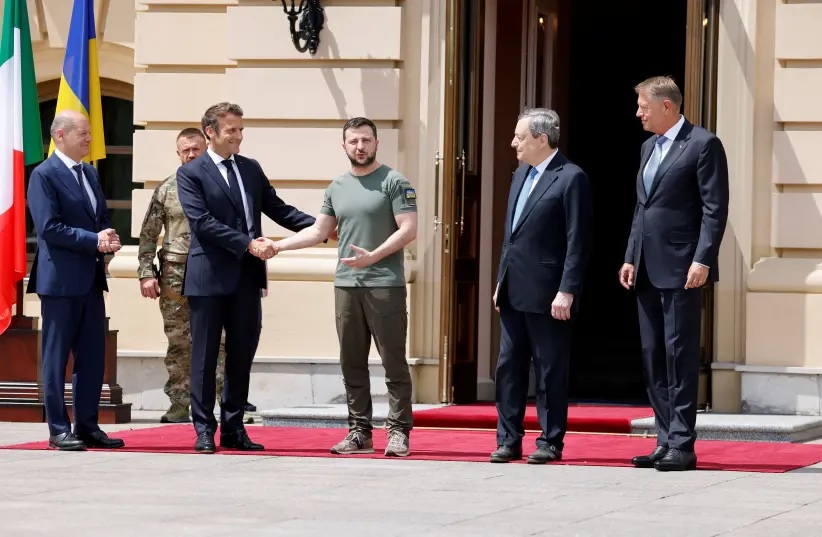KYIV, (Reuters) – The leaders of Germany, France and Italy – all criticised in the past by Kyiv for support viewed as too cautious – made a joint visit today to show solidarity with Ukraine, where officials pleaded for more Western arms.
“It’s an important moment. It’s a message of unity we’re sending to the Ukrainians,” French President Emmanuel Macron said after pulling into Kyiv on an overnight train along with Germany’s Olaf Scholz and Italy’s Mario Draghi. They were also joined by Romanian President Klaus Iohannis.
On the battlefield, Ukrainian officials said their troops were still holding out against massive Russian bombardment in the eastern city of Sievierodonetsk, and described new progress in a counteroffensive in the south.
But they said battles on both main fronts depended on receiving more aid from the West, especially artillery to counter Russia’s big advantage in firepower.
“Every day, I struggle for Ukraine to get the weapons and equipment it needs,” President Volodymyr Zelenskiy said in his nightly video address to the nation.
Air raid sirens blared in Kyiv as the visit by the European leaders got under way. They toured Irpin, a town northeast of the capital devastated early in the war, where withdrawing Russian forces once left behind bodies littering the streets.
Noting graffiti on a wall that read “Make Europe, not war”, Macron said: “It’s very moving to see that. This is the right message.”
The visit had taken weeks to organise, while the three most powerful EU leaders all fended off criticism over positions described as too deferential to Russian President Vladimir Putin.
Still, the move by the three to travel together held strong symbolism at a pivotal moment – a day before the EU’s executive commission is expected to recommend pushing forward with Ukraine’s bid to join the bloc, which EU leaders are expected to endorse at a summit next week.
NATO defence ministers were also meeting in Brussels, expected to announce more promises of weapons for Kyiv. U.S. President Joe Biden pledged $1 billion worth of new aid on Wednesday, including anti-ship rocket systems, artillery rockets and rounds for howitzers.
‘SAVE MR PUTIN’S FACE’
Scholz, Macron and Draghi all say they are strong supporters of Ukraine who have taken major practical steps to reduce Europe’s dependence on Russian energy and find weapons to help Kyiv.
But Ukraine has long criticised Scholz over what it regards as Germany’s slow delivery of weapons and reluctance to sever economic ties with Moscow, and was furious this month at Macron for saying in an interview that Russia must not be “humiliated”.
Italy has also proposed a peace plan, which Ukrainians fear could lead to pressure on them to give up territory.
“They will say that we need to end the war that is causing food problems and economic problems…that we need to save Mr Putin’s face,” Oleksiy Arestovych, an adviser to Ukrainian President Volodymyr Zelenskiy, told German newspaper Bild prior to the visit.
Ukraine is taking hundreds of casualties a day as the war has entered a brutal attritional phase in the east. Kyiv says it urgently needs more weapons, especially artillery and rockets, to counter Russia’s firepower advantange.
After Moscow launched its “special military operation” claiming its aim was to disarm and “denazify” its neighbour, Ukraine repelled an armoured assault on Kyiv in March.
Since then, however, Russia has shifted its aims and its tactics, now trying to seize more ground in the east with advances behind massive artillery bombardments, and fortify its grip over captured territory in the south.
The main battle in recent weeks has been over the eastern city of Sievierodonetsk, where Ukrainian forces are now holed up in a chemical factory with hundreds of civilians. They ignored a Russian order to surrender on Wednesday.
“There were battles during the night. Our guys are holding the line of defense. Every day it becomes more and more difficult because the Russians are pulling more and more weapons into the city, and trying to storm it from several directions,” Sievierodonetsk mayor Oleksandr Stryuk said on Thursday.
All remaining bridges linking the city with Ukrainian-held territory on the opposite bank of Siverskyi Donets river were destroyed in recent days, but Ukrainian officials say the garrison is still not completely cut-off.
An airstrike on Thursday hit a building sheltering civilians in Lysychansk, on the other side of the river, killing at least three and wounding at least seven according to local governor Serhiy Gaidai.
“We are pulling apart the rubble,” Gaidai said on Telegram.
In the south, Ukraine says its forces have been making inroads into Kherson province, which Russia occupied early in its invasion. There has been little independent reporting to confirm battlefield positions in the area.
Zelenskiy’s chief of staff, Andriy Yermak, tweeted that he had visited an area just 3-4 km from Russian positions, where dozens of “ghost villages” were depopulated by the combat.
“Our guys on the ground – the mood is fighting. Even with limited resources, we are pushing back the enemy. One thing is missing – long-range weapons. In any case, we will throw them out of the south,” he wrote.
The war has caused global economic disruption and surging prices for food and energy. Despite sanctions, Europe still depends on Russia for natural gas.
Deliveries through the Nord Stream 1 pipeline to Germany have declined in recent days, raising concern about storing supplies for winter, with Moscow blaming sanctions that have held up delivery of equipment sent abroad for repair.

(photo credit: LUDOVIC MARIN/POOL VIA REUTERS)
